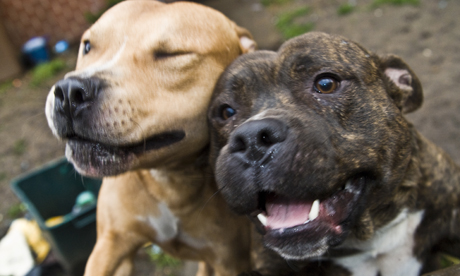Government must do more to tackle dangerous dogs, says London Deputy Mayor

Staffies like these are considered ideal pets by the UK Kennel Club Photo: Dionisio Plaza
Deputy Mayor for Policing Kit Malthouse, yesterday called on the Government to do more to tackle the scourge of dangerous ‘weapon’ dogs on London’s streets, including tougher sentences for those caught with banned breeds or whose dogs are out of control.
While welcoming new plans announced by the Government today to tighten up the existing Dangerous Dogs Act, he pointed to figures which showed that the number of Pit Bull dogs seized by the police shot up by 65 per cent in the last year, while court cases involving dangerous dog offences rose by 50 per cent between 2006 and 2007.
In the last five years London’s hospitals alone have seen admissions for dog bites increase by 79 per cent, compared to 43 per cent nationally.
Evidence collected from a wide range of agencies, including the Metropolitan Police and animal welfare groups, indicates a huge increase in the number of weapon dogs in London compared with other cities in the UK and a rise in the problem of irresponsible dog ownership.
The Mayor of London believes there should be tougher punishments for owning a banned dog or for owners whose dog is dangerously out of control or causes injury, and is campaigning for sentences for those with banned or dangerous dogs to be comparative to those for carrying other banned dangerous weapons including carrying a knife or possession of a firearm.
Deputy Mayor for Policing in London Kit Malthouse said, “Anyone using a dog as a weapon should feel the full force of the law. These animals are just as dangerous as a knife or a gun and hugely intimidating to people who live near them especially families with small children and older people.
“I am pleased that the Government has responded to our campaign calling for tougher action against the scourge of dangerous dogs, but these new plans don’t go far enough. More can and should be done but we need to avoid unnecessary bureaucracy. We do not want a DVLA for dogs.”
The aim of the Government consultation is to review and streamline current legislation to better protect the public; help enforcers tackle those who abuse the law; and stop the abuse suffered by dogs that end up in the wrong hands.
